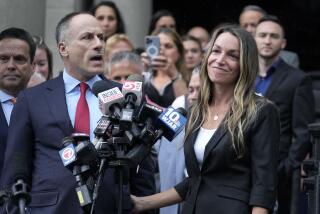New Testimony OKd in Teen-Ager’s Killing : Appellate Court Resurrects Slaying Case
- Share via
A state appellate court Thursday breathed new life into the district attorney’s battle to place Mark Alan Radke on trial for the brutal slaying of a Mira Mesa teen-ager, but Radke’s defense attorney promptly vowed to appeal.
In a seven-page opinion, the 4th District Court of Appeal said prosecutors are entitled to present new testimony at a hearing to determine what evidence the district attorney may use to build a case against Radke.
“I won the battle, but I haven’t won the war,” said Deputy Dist. Atty. Thomas McArdle, noting that he had also asked the court to overturn an earlier ruling that declared Radke’s arrest illegal and all but gutted the case. “I’d call it half a loaf.”
McArdle said the decision is “vital” to the district attorney’s efforts to retain a prosecutable case against Radke, accused in the January, 1988, slaying of Jeffrey Rudiger.
Defense attorney Douglas C. Brown, meanwhile, called the decision “very unfair” because it allows prosecutors to submit evidence they did not unveil in Radke’s preliminary hearing.
“It gives them a second bite at the apple,” Brown said. “The court is letting them reinvent the wheel and develop different facts, which is certainly not an opportunity the defense would receive.”
Brown also complained that the case continues to bounce from the trial court level to the appellate court and back again, with no quick resolution in sight.
“It’s frustrating, and, if it was a drug case, it would be done with,” Brown said. “I think because of the emotion involved and the public interest, it’s been difficult to get someone to say those magic words: ‘Motion granted, case dismissed.’ ”
Prolonged Pretrial Battle
Thursday’s decision, written by Justice Don R. Work, marked the latest round in a prolonged, pretrial battle over the murder case, which has attracted widespread attention from the public, victims’ rights groups and Rudiger’s classmates and friends.
Rudiger, a 16-year-old student at Mira Mesa High School, disappeared after work the night of Jan. 21, 1988. His handcuffed, partly clothed body was found the next day near a Scripps Ranch commercial center. He appeared to have been struck repeatedly with a hammer, and prosecutors say he was the victim of a sexual attack.
Radke, 22, who had worked with Rudiger at a Chuck E. Cheese pizza parlor, became a suspect after co-workers told police the pair were planning to meet the night Rudiger disappeared. Detectives examining his car found that the tread from one tire resembled marks left in a pool of blood at the murder scene, and investigators questioning Radke about the death noticed his hands were swollen and cut, as if he had been in a fight.
Blood matching Rudiger’s type was found inside and on the exterior of the car and on Radke’s jacket.
Last summer, the 4th District Court of Appeal ruled that Radke’s arrest during a traffic stop violated his Fourth Amendment right to protection from unreasonable searches and seizures. The justices said police had erred by placing him in handcuffs while taking him in for questioning and by drawing a revolver.
Reviews Declined
The ruling appeared to make all evidence stemming from the arrest off limits to prosecutors. Both the state Supreme Court and the U. S. Supreme Court declined to review the matter.
The case entered its next phase in February, when the defense and prosecution returned to Superior Court for a hearing on what evidence remains admissible. Brown asked Judge J. Perry Langford to suppress all evidence against Radke and to dismiss the case against his client.
Langford declined, noting that he viewed the arrest as lawful. But he also handed prosecutors a defeat, rejecting their request to use previously unheard police testimony in their argument for use of much of the evidence.
Reversed Ruling
In its decision Thursday, the three-justice appellate panel reversed that ruling and gave prosecutors the right to introduce the new testimony. That means prosecutors will have a stronger case when they return to court on the issue of what evidence is admissible against Radke.
“Our goal will be to prove that there is not a cause-and-effect relationship between the allegedly illegal arrest and the evidence collected,” McArdle said. If that can be done, much of the evidence critical to the prosecution may be preserved.
Brown said he intends to appeal Thursday’s decision, which was also signed by Justices Howard Wiener and William Todd. But he is not overly concerned about the new testimony.
“I don’t think anything they have will be a big surprise,” Brown said. “But I don’t like the fact that they’ve been given the opportunity to shore up their case.”
Neither Rudiger’s family, nor the official at the California Center for Victimology who is acting as a spokeswoman on the case, could be reached for comment. Radke remains free on $200,000 bail.
More to Read
Sign up for Essential California
The most important California stories and recommendations in your inbox every morning.
You may occasionally receive promotional content from the Los Angeles Times.













